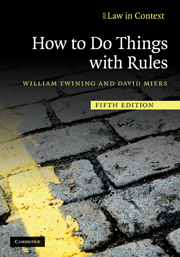Book contents
- Frontmatter
- Contents
- Preface
- Online appendices
- Acknowledgements
- Abbreviations
- Table of statutes and legislative instruments
- Table of cases
- Part I
- Part II Reading, using and interpreting rules in general
- Part III Reading law: reading, using and interpreting legislation and cases
- Part IV
- Index
- Resources on the web
- Appendix I Supplementary materials and exercises on Chapter 1
- Appendix II Normative and legal pluralism
- Appendix III Visual presentation of rules
- Appendix IV The Reading Law Cookbook
- Appendix V Supplementary materials and exercises on Chapters 7–10
- Appendix VI Supplementary materials and exercises on Chapters 9 and 11
- Appendix VII Domestic violence: a case study
- Appendix VIII MPs' expenses: a case study
- Appendix IX Hunting Act 2004: a case study
Appendix IX - Hunting Act 2004: a case study
Published online by Cambridge University Press: 05 June 2012
- Frontmatter
- Contents
- Preface
- Online appendices
- Acknowledgements
- Abbreviations
- Table of statutes and legislative instruments
- Table of cases
- Part I
- Part II Reading, using and interpreting rules in general
- Part III Reading law: reading, using and interpreting legislation and cases
- Part IV
- Index
- Resources on the web
- Appendix I Supplementary materials and exercises on Chapter 1
- Appendix II Normative and legal pluralism
- Appendix III Visual presentation of rules
- Appendix IV The Reading Law Cookbook
- Appendix V Supplementary materials and exercises on Chapters 7–10
- Appendix VI Supplementary materials and exercises on Chapters 9 and 11
- Appendix VII Domestic violence: a case study
- Appendix VIII MPs' expenses: a case study
- Appendix IX Hunting Act 2004: a case study
Summary
Introduction
The Hunting Act 2004 creates the offence of hunting a wild mammal with a dog, unless the hunting is exempt. This has been one of the most debated pieces of legislation of recent times and the controversy continues. It has been estimated that this issue took up over ten times the amount of parliamentary time than the decision to go to war with Iraq. This case study illustrates a number of important points discussed in the text, including the constitutionality of a statute, its compatibility with European Union law and with human rights law at different levels, symbolic legislation, the strategies and tactics open to committed opponents of a democratically created measure (unhappy interpreters), the relevance of public opinion, legalism, and problems of enforcement and public order in the face of concerted opposition.
This Appendix reproduces the full text of the Act (section A), reproduces excerpts from the speech of Lord Bingham in the leading case on the Act (section B), excerpts from a memorandum on enforcement (section C), a quotation from Jeremy Bentham (section D) and finally some questions and exercises. We begin by setting the Act in context.
Context
Legal challenges
The history of legislation intended to protect animals is set out in Lord Bingham's judgment in Countryside Alliance v. HM Attorney-General (section B, paras. [37–[38]). Having lost in Parliament, despite support in the House of Lords, its opponents challenged the validity of the Act along three different lines.
- Type
- Chapter
- Information
- How to Do Things with Rules , pp. 540 - 575Publisher: Cambridge University PressPrint publication year: 2010



